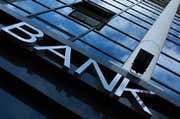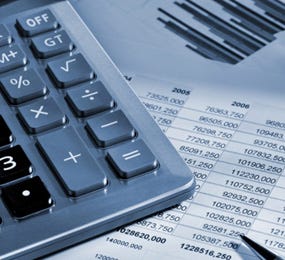With a little common sense, most people won't have any trouble selecting a reputable bank. It's true that even big-name banks can fail (like Washington Mutual did in 2008), but FDIC insurance will protect your money in those situations. It provides $250,000 in coverage per owner, per account. So if you have a joint account with a spouse, a balance of up to $500,000 would be covered. (Learn more in How the Federal Deposit Insurance Corporation Works.)
If you’ve come from a developing country that doesn’t have deposit insurance, where you couldn’t trust that your money was safe in the bank, the U.S. system should come as a big relief. As of December 2016, there were nearly 6,000 FDIC-insured banks in the United States. It’s hard to make a major mistake when choosing where to bank, but some options are better than others in terms of convenience, fees and interest rates.
Choosing a Bank
Here are the key criteria to consider when choosing where to open your checking account.
1. Legitimacy and Reputation
First and foremost, you want to use a legitimate bank. Sticking with a large, widely known bank should be a safe bet. If you're considering a smaller institution, or if you just want to be extra safe, use the Bank Find tool at the FDIC's website to make sure the bank is a member of the FDIC, which means that your deposits will be insured up to FDIC limits.
Choosing a bank with a good reputation is a bit trickier. Wells Fargo in 2016 fired 5,300 employees who had opened 2 million unauthorized bank accounts for the bank’s customers in order to meet sales targets and earn bonuses. Those customers then ended up paying fees on those accounts. Chase Bank has also paid hundreds of millions of dollars in fines and settlements in recent years related to bribing foreign officials, manipulating interest rates and other misdeeds. They aren’t the only banks that have misbehaved on a massive scale, but they are two of the most well-known examples. You may want to do your research on fraud and fines before committing to a bank.
2. Online Only vs. Brick-and-Mortar
One of the biggest decisions you’ll need to make is whether to choose a bank that is entirely Internet based or one that has both a physical and online presence. Most banks nowadays have a strong online presence even if they started out as brick-and-mortar institutions, which means that regardless of which bank you choose, you will have access to features like online bill pay, mobile check deposit and apps that let you bank anytime, anywhere from your computer, tablet or smartphone.
So where do the main differences lie between online-only banks and banks where you can walk into a branch and talk to a teller? Generally, in fees and interest rates. Because online-only banks have much lower overhead, they can pass those savings on to consumers by not having monthly maintenance fees or minimum balance requirements, and they can afford to pay a higher interest rate on savings accounts and certificates of deposit. Some of the big names in online-only banking are Ally Bank, Discover Bank and Capital One 360. That being said, community banks sometimes offer the same lower-fee, higher-rate advantages that online-only banks do while still giving you the option to meet with a banker face to face. (See eBank or Brick-and-Mortar Bank?) You may also find low-fee accounts at a large traditional bank but
Consider what would make banking comfortable and convenient for you. Do you prefer to talk to someone in person or interact with a machine? Do you want to be able to write lots of checks or would you rather pay bills online? Do you regularly deposit cash? (This is cumbersome to do with an online bank; you need a special ATM, money order or other intermediary.) What time of day and day of the week are convenient for you to bank? How responsible/forgetful are you with your money? Different banks have different features, and even different checking accounts within the same bank are designed to appeal to different sets of needs. (Credit unions, while beyond the scope of this tutorial, offer an alternative to banks. Read Credit Unions vs. Banks: Which Is Better? to learn more.)
3. Location and Size
Most people who want an account at a brick-and-mortar institution want to use a bank that has a branch close to where they live and/or work so that visiting a teller and making deposits and withdrawals will be convenient. If you don’t travel frequently, this could be a large, national bank or a smaller regional or community bank. If you do travel frequently, you’ll want to do some research to see which banks have locations where you find yourself most often. You’ll want to have easy access to your money when you’re out of town, a real person to talk to face-to-face if you have any problems and no service charges for using out-of-network ATMs.
The other major consideration when it comes to size is that some people may find that the customer service is better at smaller banks and that these banks take more of an interest in the local communities where they operate. There’s no universal rule, here, though, so if these factors are important to you, your best bet is to visit the bank in person and see what kind of experience you have.
If you choose an online-only bank, you’ll typically have access to a network of fee-free ATMs nationwide. Your bank may also reimburse you for a certain number of out-of-network ATM fees per month.
4. Fees
Some banks are free to use as long as you keep your account balance in the black, while others nickel and dime their customers with fees at every turn. Even small fees can add up over time and eat into your account balance, so look at a bank's fee schedule carefully before you sign up and make sure you understand what you need to do to avoid fees.
This advice holds true even if you sign up with a bank that advertises free checking; there are always fees somewhere. You may encounter fees for letting your balance fall below a certain threshold, not having your paycheck directly deposited to your account, overdrawing your account, using an ATM, requesting paper statements and even closing your account. (Find out how to get the bank to pay you for using their services, not the other way around, in Cut Your Bank Fees.)
Now that you know a few things about choosing a bank, in the next section, we'll teach you how to use your new account.
Banking: Check-Writing 101
-
 Personal Finance
Personal FinanceYour 9-Point Checklist for Selecting an Online Bank
When selecting the right online bank for you, rates are not the most important factor. -
 Personal Finance
Personal FinanceBank Account Tips For Young People
If you’re just getting started with managing your own bank account, these tips will show you how to do it right. -
 Personal Finance
Personal FinanceThe Ins and Outs of Bank Fees
These service charges could nickel-and-dime you right out of your nest egg. -
 Personal Finance
Personal FinanceOnline Banks: Lower Costs And Little Sacrifice
For many, online banking has become a day-to-day routine. Still, there are some holdouts who refuse to accept the method. -
 Tech
TechNew Bank Account? Don't Be Without These 6 Features
Certain banking features can make managing your finances easier, so it's important to choose carefully when opening a new checking or savings account. -
 Personal Finance
Personal FinanceWhy You Should Stick With The Big Banks
Big doesn't always mean bad. We tell you four reasons why. -
 Personal Finance
Personal Finance5 Bank Fees You May Not Know About
Banking regulations have recently changed and fees are following suit. -
 Personal Finance
Personal FinanceRetail Banking vs. Corporate Banking
Retail banking is the visible face of banking to the general public. Corporate banking refers to the aspect of banking that deals with corporate customers. Check out more on the differences between ...



